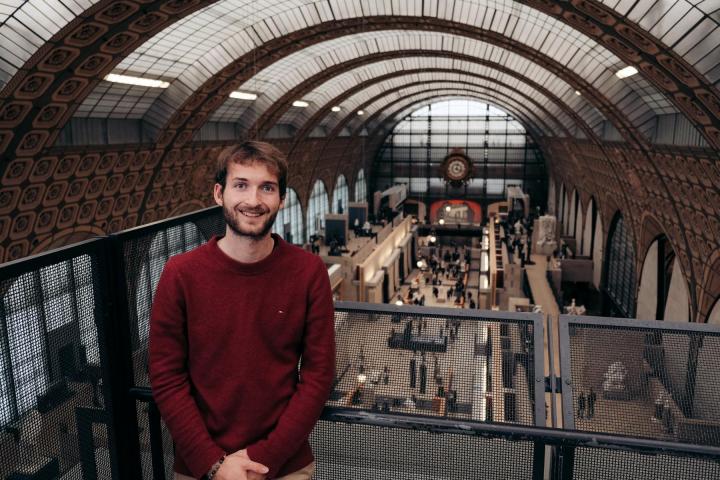
At the extremely prestigious Massachusetts Institute of Technology: MIT, he met passionate faculty and colleagues and had the opportunity to be involved in significant projects. He considers the opportunity to spend at least a few semesters at prestigious universities an open door for every student's professional development. Read what he has to say about his career.
What is your field of study and how did you get into nuclear materials at Faculty of Mechanical Engineering of the Czech Technical University in Prague?
I am in the last semester of my Master's degree program in Manufacturing Engineering, specifically specializing in Materials Engineering and I consider the Institute of Materials Engineering at Charles Square as my base. I am not far from the atom though, I got to it through fuel rod coatings, which was the topic of my bachelor thesis. I then gained further insight into nuclear engineering, for example, at the Summer University directly at the Dukovany power plant.
According to Instagram, you have travelled to several countries for study purposes. Have you been looking for the perfect university or do you just like to explore the world?
When I look back on it, I can't believe the opportunities I was given. Especially in the early days of my studies, I used to struggle to justify all those hours spent on theoretical problems. The idea that I could learn about the world through my studies was honestly motivating. I was interested in how teaching is done at the world's leading universities and what demands are made on students there. I was surprised to find that studying is much less tied to rigid requirements for specific knowledge. You could say that the university serves more as a tool to develop students in independent work. In addition to the rankings, I also tried to take into account the courses offered and the location.
To travel through study is a tremendous opportunity. You find yourself in a completely different environment and it's up to you how you approach it. Foreign universities often offer students to combine different subjects across faculties, which is a great opportunity to learn something else against the home curriculum. It also allows you to work in a more holistic way, with people with expertise in engineering, design, economics or programming involved in the semester project.
Of course, exploring the world is part of these trips and it's not always easy to concentrate when there are skyscrapers, jungles, beaches, monkeys, typhoons or -35 degrees outside the window. A lot of things sometimes don't go according to plan, and there are new situations to deal with besides studying, but it gives you perspective on a lot of things. After all, what better way to appreciate living in the Czech Republic than after experiencing a three square meter nano-apartment in Hong Kong?
Which universities did you study at and with what field of study?
During my bachelor studies, I went to Vilnius Technical University, the capital of Lithuania, for a year through Erasmus+. I was enrolled in Faculty of Mechanical Engineering, and since the school allowed us to combine subjects from several faculties, I spent one semester mostly in manufacturing technology and metrology and the second semester focused more on industrial management and business economics.
During the covid outbreak, I took the opportunity to spend two short but very intense trips through the Athens program. In France, at Arts et Métiers ParisTech, I took a course on the mechanical properties of polymers and composites, and at the Polytechnic of Bucharest I learned about the application of biopolymers in tissue engineering. As polymers and composites are not the main focus of my degree programme, it was a very interesting insight into their practical application, for example in Paris we carried out tests on a composite container for hydrogen cars.
Ever since I was a freshman, I dreamed of one day getting into one of the top schools, and that came true my senior year. My semester in Hong Kong was first cancelled four days before my departure due to the then-new omicron variant of the coronavirus, but CTU allowed me to reschedule my trip for the next semester, for which I am grateful and would like to thank the rector's office. I studied renewable energy and advanced manufacturing technologies from lasers to 3D printing at the Polytechnic University over there. Just before leaving for Hong Kong, I was then offered a research internship at MIT focusing on new nuclear fuel materials, where I am currently working on my thesis.
How did you get accepted to the prestigious MIT? Did you have to submit a successful project or recommendation?
I was lucky enough to get an offer to participate in the research of new materials for fuel cover at the former Institute of Nuclear Fuels in Zbraslav, Prague, immediately after my return from Erasmus. At UJP Prague I became a member of the zirconium alloys research team, produced my bachelor's thesis within six months and was subsequently offered a principal position on site. Due to online teaching and a high degree of flexibility and tolerance, I was able to participate in experimental work for more than three years, gaining insight into nuclear fuels while presenting research results through international conferences and papers. Thanks to this experience, I was then recommended for this research internship, and acceptance was through a video interview with Professor Shirvan, who was interested in my previous experience in fuel materials testing.
What do you see as the biggest difference between studying in the USA and the Czech Republic?
I was surprised at first how big the campus is. MIT consists of nearly two hundred buildings, yet there are fewer students here than at CTU. There are state-of-the-art laboratories and research facilities, and students are deeply engaged and involved in research at all hours of the day and night. At the same time, there is a first-class service, from various study rooms to the communication department, so that publications are not unnecessarily hampered by the language barrier. It's not easy to get in, with fewer than seven out of a hundred applicants succeeding, which reflects on the commitment that colleagues here exude.

MIT is apparently quite cosmopolitan. Were you surprised by the environment, customs or actions of your colleagues and teachers?
MIT is a highly selective university, so students are expected to have a high degree of independence and initiative. In other words, you don't get anything served to you for free. Faculty and students work together as a team. People here are motivated and passionate about what they do. It's a wonderful environment and company to develop in. With that comes a great deal of responsibility. It's a privilege to be here and I appreciate the opportunity, but I also approach it with humility and it's also a big challenge and test and I'll do my best to pass.
Is there an obligation to participate in research projects related to your studies?
Definitely for me, as research is the main focus of my time here. For full-time students, it depends on the institute they are studying at, but usually yes. Students here are divided into undergraduate group, and graduate group, as PhD and MSc studies tend to be linked (with the possibility of finishing after two years with a Master's degree). Teaching often takes place in a very small circle of perhaps only four or five students, with the emphasis on the theoretical side of things and students then practising the material through complex and extensive assignments and independent projects.
Graduate students typically spend time outside of their studies in laboratories, have their own office, are involved in projects and participate in science. Involvement in research projects allows for high quality and highly valued practice and experience, but on the other hand, it comes at the cost of a very demanding time schedule that requires a lot of effort and discipline. MIT is about opportunities and if one wants to get involved, the door is open.
What did you put the most effort into at MIT?
So far, I have completed my first month and my daily routine consists mainly of various training and learning to work on different devices. Specifically, I am working on the thermomechanical behaviour and characterisation of so-called Accident-Tolerant Fuels, or fuels with increased resistance to accident situations. There are a number of concepts in various stages of development, so the scope of the internship here is broad. In addition to mechanical testing, I spend a lot of time on electron microscopes, working on the development of a new coating, and later we would like to subject the materials to irradiation experiments. In all this, I try to keep an eye on all the formalities and paperwork that come with being in the US, and there is certainly no shortage of them. On the other hand, I take it positively, I think it teaches you to be independent and I actually enjoy overcoming these little challenges.
At which university did you gain the most knowledge and skills?
I took away something different from each university. I guess I can't rank them like this because studying abroad also gives you a tremendous overlap outside the classical curriculum of the education system - I don't know how to rank against each other the fact that in Lithuania I gained the confidence to speak English fluently, in Hong Kong through teamwork with local students I got to know a completely different mentality and approach to work, or when I managed to go through a huge bureaucratic procedure after my trip to America. I am very grateful for these irreplaceable experiences and I believe that together they help to shape my profile as a graduate beyond the classical knowledge of mechanical engineering.
*************
I thank CTU for the support and the opportunity to complete all these study placements. Finally, I would like to motivate other students not to be afraid of the trips and go for it. Once you go, you will find that there are many more opportunities out there waiting for you all at once, and who knows what all doors it will help you open. Through study or research, you can go anywhere, even if it may seem out of reach at first. Greetings from Boston,
Petr Červenka